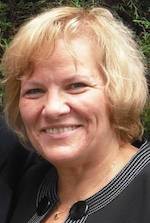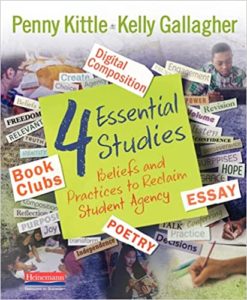4 Essential Studies: Beliefs and Practices to Reclaim Student Agency
By Penny Kittle and Kelly Gallagher
(Heinemann, 2021 – Learn more)
Reviewed by Helene Alalouf

How serendipitous that both Gioia’s recent book and 4 Essential Studies should both remind me of immersion and choice! Can you teach writing if you do not write? Can you support creativity without knowing digital tools like iMovie and podcasting?

Each of the authors’ four studies builds on the same four elements: the authors’ beliefs in teaching about the study; the important instructional practices with suggested titles; ideas for assessment and grading focused on portfolios and publishing rather than rubrics, and closing thoughts on achieved outcomes.
You might want to argue state tests do not allow time for student choice to explore their interests and personal experiences. To succeed on the tests, their responses to literature depend on formulaic literary analysis informed by the teacher’s researched text deconstruction.
Kittle and Gallagher, instead, promote college and career readiness built upon creativity and options that include reading grade-level knowledge-rich books daily, weekly inquiry-based discussions, brief formatives with conferring, and a number of formal written assignments (p.77). We should encourage their writing with original poetry and digital presentations also.
Citing Gholdy Muhammad‘s Cultivating Genius, they propose that personal essays are as rigorous as the traditional analytical essay but are culturally responsive and honor students’ development of selfhood by telling their story.
“…[S]tudents do not achieve agency unless they are making decisions,“ they write. (p.24)
One – Teaching the Essay as an Art Form, with Range and Feedback
• Range for imagining options for form and style through text study:
Students consider a topic and organization choices by examining a range of essays – “all excellent, all different“ – noting and naming characteristics of structures and craft to emulate in their own writing.
A poignant example of how this can empower students is illustrated by Mitzy writing to her state’s senators about the lack of mental health services, and including companion arguments. Subsequently, after identifying the struggles that she and other immigrant children have faced, she started the Latinx Student Union, “[b]ringing students together with allies to study current issues, promote diversity, and show appreciation for the Latin and Hispanic community. All because of one essay.“ (p.43)
• Feedback that moves writers in Writing Conferences and Writing Groups:
My wise mother had me read my compositions aloud to her at the kitchen table while she prepared dinner. Among her questions: “What are you working on? How can I help?” And my responses: “Do my transitions work? Do I have enough evidence to support this position?”
“Four things have made students better writers – a volume of practice, choice, modeling, and feedback. Grading is not on this list.” (p.38) Reflection, rather than rubrics!
Two – Book Clubs: The Best Teacher of Reading is the Reading
I was surprised Kittle and Gallagher did not mention Reciprocal Teaching and the Fab Four as a way to raise student agency. They did promote volume, range, and talk for developing lifelong readers. Choice engages adolescents, and book clubs hold students accountable. They read more, with stamina. And because they must make sense of meaning, they apply strategies.
Though I attribute my National Board certification to student-led book discussions, implemented after reading Literature Circles: Voice and Choice in Book Clubs and Reading Groups by Harvey Daniels, what surprised me here is that book clubs can transcend the classroom by corresponding across the country, balancing relevant, thematically related contemporary literature and nonfiction, and before or after core study as the second essential examination of big ideas across texts and across authors.
“Rigor is not in the book itself, but in the work students do to understand it” (p.47-49), as the authors illustrate in the student examples they display.
“Throughout the unit, we formatively assess their progress through conference, daily quick writing in notebooks, table level and whole class discussions, and weekly self-generated two page spreads“ – as well as interactions with others via Flipgrid and Google (p.75).
The summative essay prompt, given before the text-based unit began, is How did this reading experience change your thinking about [the essential question]?
Three – Poetry: The Potential for Unexpected Things
I just helped my granddaughter in third grade write a four page analysis, with prescribed questions, of “Ickle Me, Pickle Me, Tickle Me Too” by Shel Silverstein. I also visited a classroom where the teacher displayed a rhyme scheme and asked students to do the same “analysis” on the rest of the poem.
Rather than dissecting a poem using the teacher’s guide points, we should invite students to study a volume of poems and write their own. Kittle and Gallagher’s vision is “that all of our students will develop a hunger to read and write poetry” (p.81). Here are some techniques I look forward to implementing:
● Playing with language via found poems (collage of words, phrases) and mashup (select lines from different poems to fashion a new poem).
● Contributing to poetry discussions and immersive study: Big Paper exchanges; Paired Readings; and analysis based on reading a volume of 20 poems by the poet of the day, selecting the best three, and discussing, “What is the poet good at?”
● Teaching the language of poetry: A tournament requires students’ analysis of affective and technical elements in page or stage poems, then writing an analysis.
Four – Digital Composition: Crossing Genre Boundaries
More ideas I plan to explore and share:
● Let your curriculum evolve with a four-week study in two stages: co-creating a 1-2 minute documentary and creating a project of choice in one digital literacy medium (movie, podcast, TED talk, audio-recording, PSA, etc.). Use student experts who know the digital skills we do not.
● Teach the process with structures and routines: status checks, conferences and mid-process feedback, weekly progress reflections, annotated bibliographies of mentor texts for a range in this genre, checklists for project requirements.
● Mini-lessons can increase analysis of digital texts, guide students’ organizational decisions, teach digital literacy skills, and share projects to expand possibilities.
Dana Gioia writes: “The books we read are no different from the people we meet or the cities we visit. Some books, people, or places hardly matter, others change our lives. No one else will ever read, reread, or misread the same books in the same way or in the same order.” Gioia.
Whatever way you choose to approach the remarkable body of work created by Kittle and Gallagher, make the choice to immerse yourself in 4 Essential Studies. As your students gain agency, they will thank you as readers and writers.
Since attaining her Masters from Teachers College, Columbia University, and later National Board Certification, education consultant Helene Alalouf relishes opportunities to share her passion and informed fluency of research-evident principles to ensure a productive learning environment, cognitively and affectively, to support educators and families in realizing their vision. At leisure, she enjoys walking and cooking with family and friends, reading, and knitting.




More Stories
Creating a New Status Quo
What To Do if Your Application Is Declined
Toyota Land Cruiser May Return to America